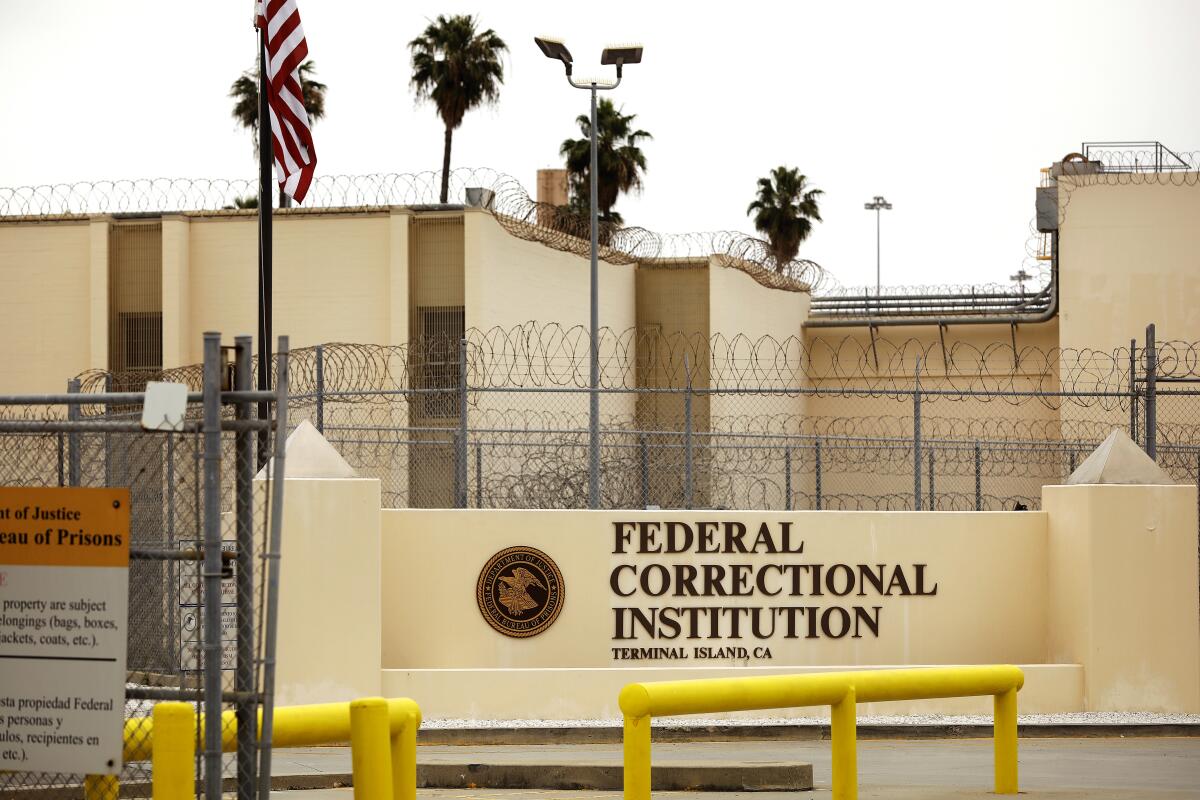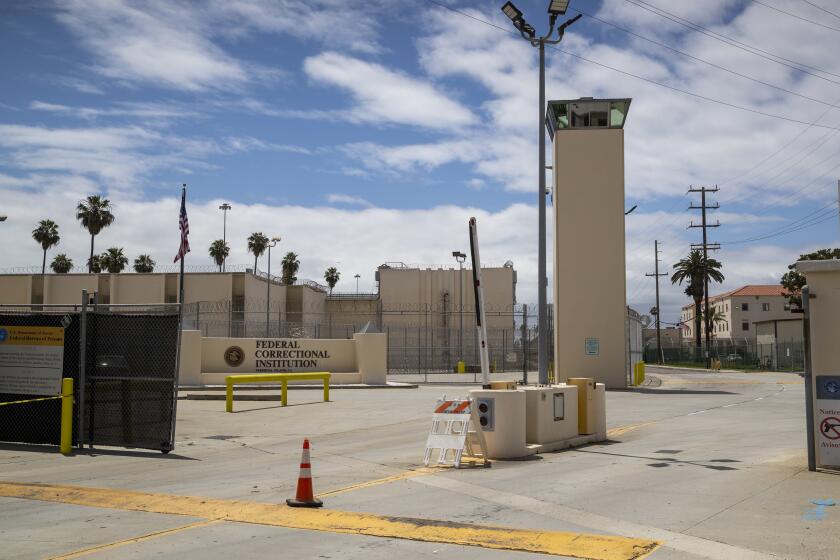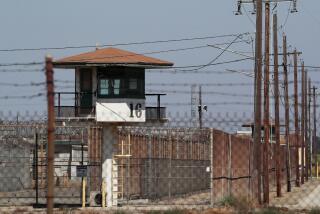Inmate labeled as ‘recovered’ from coronavirus dies at Terminal Island

- Share via
A ninth inmate infected with the coronavirus at the federal prison on Terminal Island in San Pedro died this week after authorities said the man had previously recovered from the illness.
Adrian Solarzano tested positive for the virus on April 16 and was placed in isolation. The Federal Bureau of Prisons deemed him “recovered” on May 10 after he no longer showed symptoms.
But five days later — on May 15 — Solarzano was admitted to a hospital after complaining of chest pain and anxiety. He was tested twice for COVID-19, and authorities said both results were negative. But his condition worsened, and he was pronounced dead by hospital staff Sunday.
Terminal Island, which has the second-highest death toll among all federal prisons, instituted mass testing at the facility last month, following Los Angeles County Department of Public Health guidelines.
As of Tuesday, 443 of the prison’s 1,055 inmates have the coronavirus, along with 10 staff members. Two inmates have died from COVID-19.
Solarzano, 54, was serving a sentence of more than 20 years for racketeering and drug charges. He had been at the facility since August 2013.
Prison officials said 42 of the nearly 700 inmates at Terminal Island who had tested positive for the virus had not yet been deemed “recovered” as of Thursday. About 70% of the prison population has tested positive, with many being asymptomatic. The facility typically holds just over 1,000 inmates in its dormitory-like settings.
The federal prison board’s handling of the outbreak at the low-security facility, which caters to those with medical needs, has been criticized by several California congressional members.
After touring the prison earlier this month, Rep. Nanette Diaz Barragán said there was “no physical distancing happening” and described inmates as screaming for help. Many in the units for highly infectious inmates were only supplied with cloth masks, she said.
The ACLU filed two class action lawsuits on behalf of prisoners at Lompoc and Terminal Island, claiming officials mishandled coronavirus outbreaks.
The American Civil Liberties Union has filed a pair of class-action lawsuits on behalf of prisoners at Terminal Island and Lompoc, claiming officials mishandled outbreaks at the facilities, where a combined total of about 1,800 inmates have been infected. More than 900 inmates have tested positive at Lompoc — the most in a federal prison — with 884 deemed recovered, according to the Board of Prisons.
“While the rest of California took extraordinary measures to stop the spread of coronavirus, the Bureau of Prisons failed to take preventive measures as basic as isolating sick prisoners, allowing social distancing, or providing enough soap,” Peter Bibring, senior staff attorney at the ACLU of Southern California, said in a statement. “Their deliberate indifference to the risk of disease violates the Constitution, and puts both those in prison and the surrounding community at risk.”
The lawsuits allege that officials at both facilities allowed the virus to spread by failing to provide clean environments, basic sanitary supplies and personal protective equipment to prisoners and staff.
The prisoners have tested negative but have histories that make them vulnerable in a facility where the coronavirus has infected every dormitory.
Overcrowding makes it impossible for prisoners to maintain social distancing or take other precautions, but officials have refused to consider the majority of inmates for release into home confinement despite directives to do so, according to the lawsuits. The refusal amounts to cruel and unusual punishment prohibited by the 8th Amendment, the suits claim.
In an attempt to provide more space, prison officials have moved inmates into field tents and warehouses that were hastily converted into makeshift living spaces, the lawsuit states.
Two Terminal Island prisoners named in the lawsuit — Maurice Smith, 50, and Edgar Vasquez, 32 — say that, amid the outbreak, they were moved to one such space, an old warehouse that had no heating or hot water for showers. The warehouse is also “infested by a veritable menagerie,” including mice, raccoons, feral cats, possums, skunks, and bats that fly through holes in the ceiling, the lawsuit states.
There, inmates sleep on folding cots three feet from the floor, and up to 60 prisoners share four toilets, four sinks and four showers, according to the lawsuit.
“In the face of a COVID-19 outbreak, Terminal Island has the worst of all worlds,” the lawsuit states.
Both complaints note that the CARES Act, which became law March 27, gave Bureau of Prisons officials broad discretion to reduce prison populations by releasing inmates into home confinement. That was followed by an April 3 memo issued by Atty. Gen. William Barr urging the bureau to take such actions for medically at-risk prisoners, especially at facilities with outbreaks, the lawsuits state.
At least two of the Terminal Island inmates who died from COVID-19 — Scott Cutting, 70, and James Lino, 65, both of whom had underlying health conditions — should have been on the shortlist to be released into home confinement per the directive, the lawsuit states.
More to Read
Sign up for Essential California
The most important California stories and recommendations in your inbox every morning.
You may occasionally receive promotional content from the Los Angeles Times.












